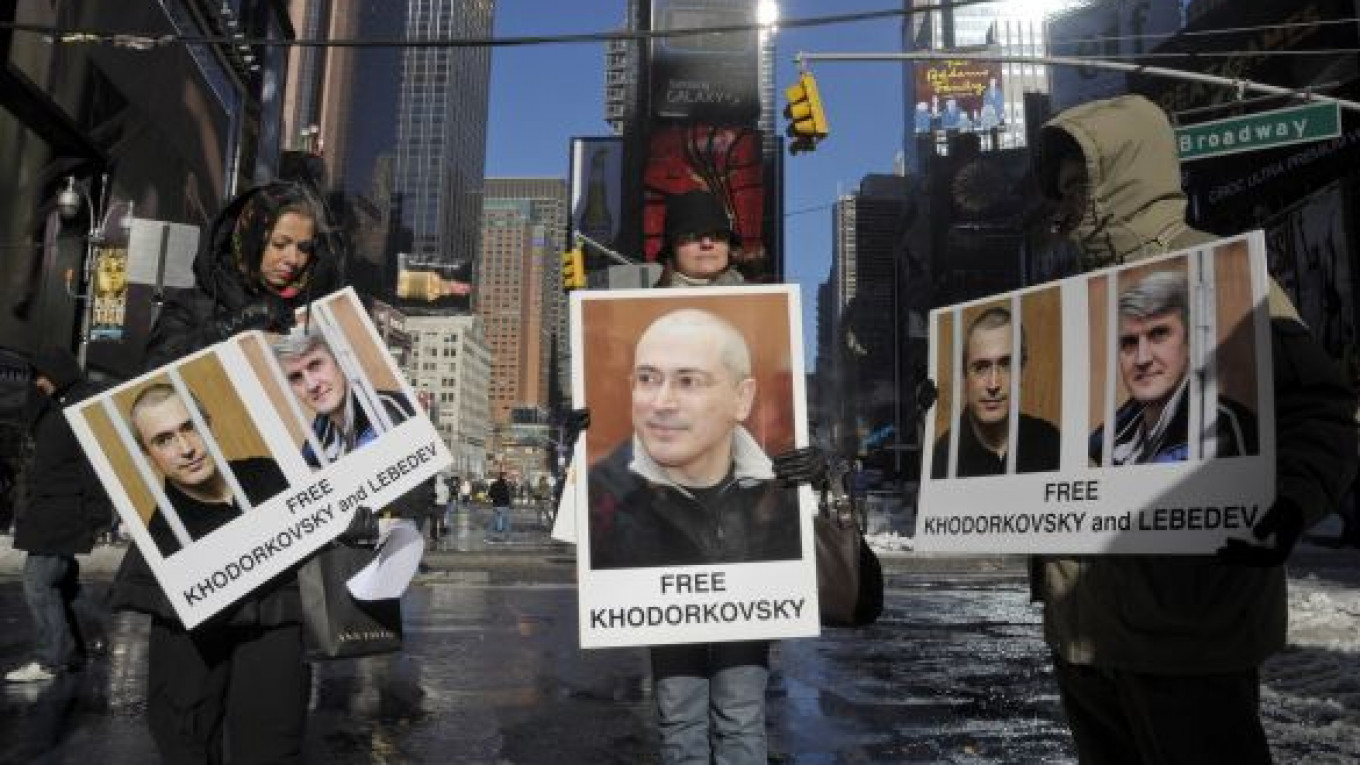The risk of doing business in Russia will increase in the eyes of many foreign investors after the second conviction of Yukos chief Mikhail Khodorkovsky last month, Kremlin economic aide Arkady Dvorkovich said Wednesday.
“I think a considerable portion of at least the foreign community will have serious questions, and the assessment of risks of working in the Russian Federation will rise,” he said in an online interview with Gazeta.ru.
President Dmitry Medvedev will have a chance to hear what the guilty verdict means for foreign investors when he travels to the World Economic Forum in Davos, Switzerland, next week, Dvorkovich said.
“These questions will be asked to all members of the Russian delegation, and the attitude of investors will become clear,” said the aide, a graduate of Duke University in North Carolina, adding that he wanted to refrain from commenting on the fairness of the verdict.
A Moscow court extended Khodorkovsky's current jail term — and that of his business partner Platon Lebedev — by six years, till 2017, in a Dec. 30 ruling that found them guilty of theft and money laundering in running their oil company. Their previous convictions were for fraud and tax evasion.
The case is widely regarded as punishment from Prime Minister Vladimir Putin for Khodorkovsky's independent political agenda and commercial ambitions.
Dvorkovich's concerns contrast with comments made last week by Foreign Minister Sergei Lavrov, who played down the verdict's potential effects on the investment climate. “Emotions” hopefully won't prevent Russia from drawing more foreign money this year, Lavrov said, arguing that China remained a magnet for U.S. business interests despite Beijing's lukewarm political relations with Washington.
One of the reasons that the country’s investment climate is not good enough is that Putin's Cabinet could have done more to improve the situation, Dvorkovich said.
“Of course, a share of responsibility — and the prime minister himself mentioned this — rests also on the Cabinet,” he said.
But Dvorkovich added that Putin did well in steering the economy through the global recession, saying the recovery was faster than in most other countries.
“From this prospective, I no doubt believe that the work of the prime minister was effective,” he said.
On another topic, Dvorkovich said the share swap between Rosneft and BP — and their agreement to jointly explore and develop Arctic offshore fields — was a commercially “logical” deal.
“These kinds of deals should become a normal practice,” he said.
The alliance, announced last week, can be viewed as a step by the government toward the planned sale of a Rosneft stake to private investors, he added.
The government announced last year that it wanted to privatize 25 percent minus one share in Rosneft by 2015, which would reduce the state's holding to a little over 50 percent.
Dvorkovich said the Cabinet will hopefully decide this year to reduce the payroll tax beginning in 2012. The tax went up this year to 34 percent from 26 percent, stimulating tax evasion.
Dvorkovich also expressed his views on political freedoms, saying the main change of President Dmitry Medvedev's term so far was the effort to make officials, including the head of state, more open for online communication with the people to respond to their concerns.
“It is more important than any political parties and rallies, and more important than what takes place on television channels, because it gives the opportunity to act faster and more effectively,” he said.
A Message from The Moscow Times:
Dear readers,
We are facing unprecedented challenges. Russia's Prosecutor General's Office has designated The Moscow Times as an "undesirable" organization, criminalizing our work and putting our staff at risk of prosecution. This follows our earlier unjust labeling as a "foreign agent."
These actions are direct attempts to silence independent journalism in Russia. The authorities claim our work "discredits the decisions of the Russian leadership." We see things differently: we strive to provide accurate, unbiased reporting on Russia.
We, the journalists of The Moscow Times, refuse to be silenced. But to continue our work, we need your help.
Your support, no matter how small, makes a world of difference. If you can, please support us monthly starting from just $2. It's quick to set up, and every contribution makes a significant impact.
By supporting The Moscow Times, you're defending open, independent journalism in the face of repression. Thank you for standing with us.
Remind me later.






